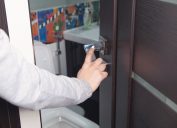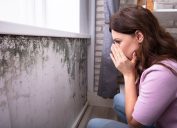Why You Shouldn't Be Cleaning Your Bathroom With Bleach, According to Experts
You may want to reevaluate the cleaning products you're using in your shower and toilet.
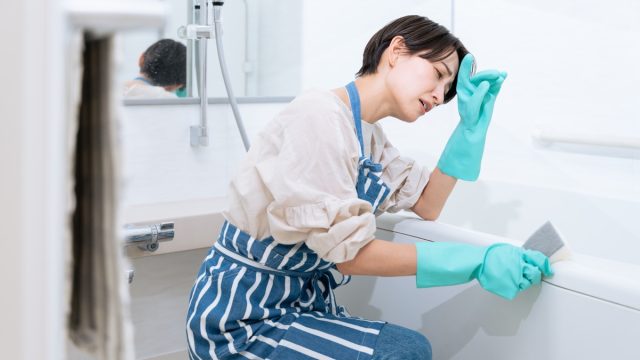
Bleach is often heralded as the be-all and end-all of cleaning products. It's known to remove even the toughest stains, and was recommended as a disinfectant during the pandemic for COVID-contaminated surfaces. But you should think twice before you pull out the bleach for any cleaning job—and not just because you could ruin your clothes. As it turns out, cleaning with bleach is not advisable when it comes to your bathroom. Read on to learn why experts say you should go with another cleaner instead.
READ THIS NEXT: If You're Using Any of These "Unsafe" Cleaning Products, Stop Now, FDA Warns.
People have been using bleach more than ever over the past few years.
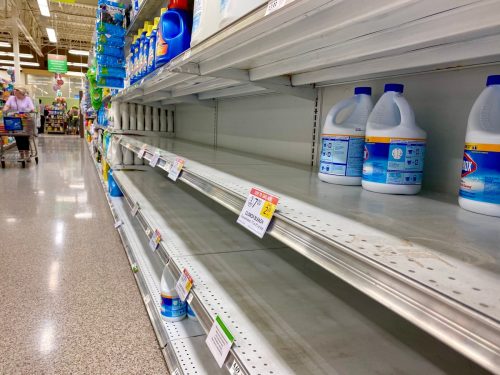
The COVID pandemic changed our lives in countless ways—and that certainly goes for our cleaning habits. A National Cleaning Survey from the American Cleaning Institute found that 22 percent of people in the U.S. say they're using bleach more now than they were before the spread of COVID.
The spike in bleach use, however, has led to some ill-advised applications.
The Centers for Disease Control and Prevention (CDC) reported in 2020 that some people had admitted to putting bleach on their food and gargling diluted bleach solutions in an attempt to avoid getting COVID. These are considered to be "nonrecommended high-risk practices" of the cleaning agent, because of the potential health risk, according to the agency.
While most people know that bleach should be kept far away from their mouth, there are other seemingly innocuous uses for this cleaning agent that you should still be avoiding.
Experts say you shouldn't use bleach in the bathroom.
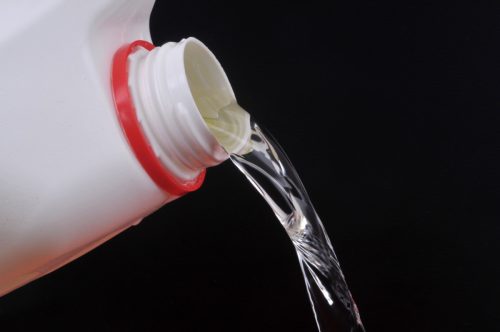
If you're bringing bleach into the bathroom, think again.
"Bleach is known for brightening whites and killing mold, but that doesn't mean it is necessarily a good bathroom cleaner," says Steve Evans, owner of the Tennessee-based house cleaning service Memphis Maids. In fact, bleach is strong enough to cause some serious problems.
"Bleach is a powerful oxidizing substance that may discolor, deteriorate, and weaken many different types of materials due to the breakdown of their chemical structure," Kim Abrams, a home expert and CEO of Abrams Roofing, explains. "You'll most likely find these materials in a bathroom, where they can cause a significant repair bill if broken."
For more cleaning advice delivered straight to your inbox, sign up for our daily newsletter.
Bleach can damage many bathroom fixtures.
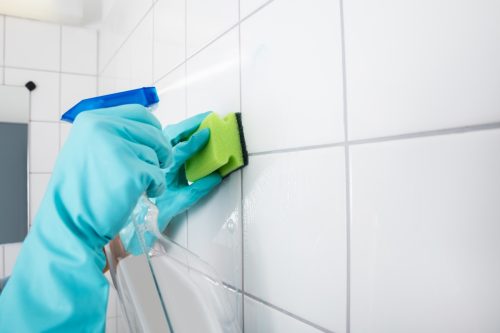
Chris Willatt, owner of the Apline Maids cleaning service in Denver, Colorado, says many people have damaged different parts of their bathroom just by using bleach.
For instance, this strong oxidizer can quickly degrade the caulk in your shower, according Willatt. "So if you use bleach, you need to caulk your shower every three months," he warns.
Bleach can also eat away at other materials in your bathroom with prolonged use because of its corrosive nature, according to Alex Varela, general manager of the Texas-based house cleaning service Dallas Maids.
"It can corrode metal fixtures and break the tiles' protective coating, which can lead to stains and humidity issues," Varela explains.
Even your toilet could get on bleach's bad side. Melanie Musson, a home cleaning expert with Clearsurance, warns of potential trouble if you have a septic tank connected to your commode.
"Septic tanks operate efficiently when good bacteria break contents down," she says. Putting bleach in your toilet can get in the way because it kills all bacteria—both good and bad. "So your septic system won't work well with bleach."
There are other cleaning supplies you should use in your bathroom.
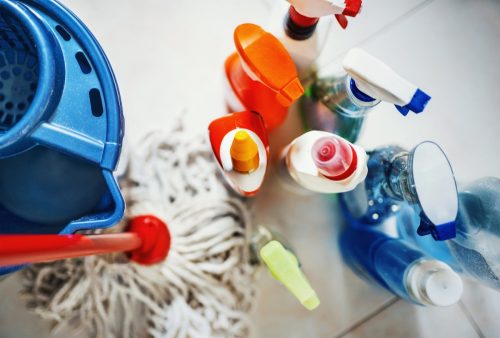
Many people clean their bathroom with bleach because they assume it'll do the job faster and better than any other product. But according to Varela, bleach isn't actually all that useful when it comes to everyday cleaning.
"It won't be that helpful because it doesn't have dirt-removing or grease-removing properties, which is the number one issue for regular cleaning," Varela points out.
As a result, bleach often ends up more harmful than helpful, according to Karina Toner, the operations manager at Spekless Cleaning in Washington, D.C.
"It's important to be aware of the risks and weigh the potential benefits and harms of using bleach," she advises. "There are other cleaning products that can be effective in cleaning your bathroom without the risks of using bleach. For example, vinegar, baking soda, or hydrogen peroxide can be good alternatives."
If you need to disinfect your surfaces, Varela says that bleach can be helpful in those particular instances—but only if you use it correctly and sparingly.
"Try to use bleach only to kill mold or disinfect surfaces and always dilute it in water," Varela says, adding that one part bleach to 10 parts water is best.
